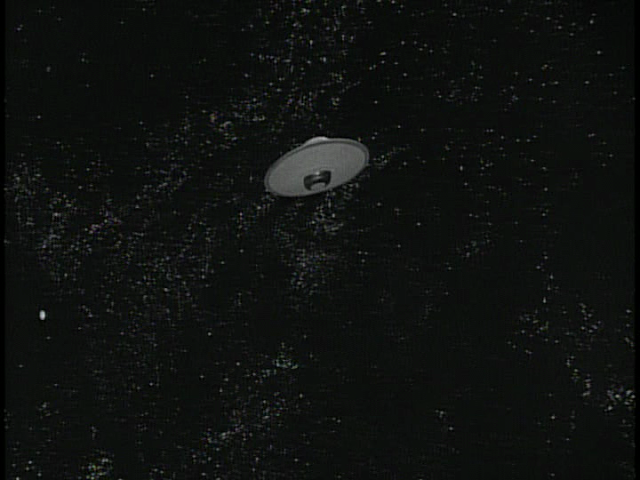Nightmare at 43 Hillcrest (ABC’S Wide World of Mystery;
originally broadcast 8/20/74)
 In this rather perilous, long-forgotten vista into a lost suburbia, circa 1974, a real-life nightmare scenario unfolds for
a mild-mannered family of three. The subject of this tense, foreboding episode of ABC’S
WIDE WORLD OF MYSTERY (produced by Dan Curtis), based on true accounts, is arguably as relevant today as it ever has been.
In this rather perilous, long-forgotten vista into a lost suburbia, circa 1974, a real-life nightmare scenario unfolds for
a mild-mannered family of three. The subject of this tense, foreboding episode of ABC’S
WIDE WORLD OF MYSTERY (produced by Dan Curtis), based on true accounts, is arguably as relevant today as it ever has been.
The story begins as the camera silently probes the darkness in and around
the Leyden residence, while they
sleep. It’s an ominous preamble to a
home invasion, and when the front door bursts in and a group of armed men drag
the Leydens out of their bedrooms, casting menace and threatening violence at
every turn, it’s easy to assume this average American family is being robbed, or
worse.
But there’s a twist here, and it’s a rather unsettling one: the intruders are detectives from the local police, and it seems they
believe the Leydens are drug pushers.
Less than a minute into this chaotic scene, it’s quite
apparent the Leydens believe, like the rest of us, that they
are being robbed. Only after being
assaulted and knocked to the ground in front of his horrified wife and teenage daughter
does Greg Leyden (Jim Hutton) learn the truth: these guys are detectives and are
in his home to arrest him—to arrest them—for
dealing heroin. Furthermore, their brutal leader, Detective Clarence Hartog (Peter Mark Richman), is steadfast in his
conviction that the Leydens are dope pushers.
 |
| Esther (Emmaline Henry) and Nancy Leyden (Linda Curtis), awake in a nightmare. |
But just as soon as the detective has pistol-whipped Greg
Leydon to the ground in front of his shocked wife and daughter, his second in command,
Detective Sanford ‘Sandy’ Bates (Don Dubbins), is grabbing his elbow, looking
gravely concerned. After some prodding,
he manages to corral his hard-driving superior out front for a word in private.
And, oops…well, it seems they’ve hit the wrong house—they were
supposed to raid 43 North Hillcrest. Additionally, they’ve just terrorized an innocent family and viciously assaulted its patriarch as result of their egregious error. But as Sandy
is about to head back in and spill the beans, Hartog takes hold…"I’m arresting
these people." "You’re what?!" "You heard me. I can’t afford to
blow 20 years over a little mistake." "A little mistake?!"
"There’s some heroin packaged in the car. Plant ‘em.”
“Clarence, these people are innocent!" "Do you want to go back to walking the beat?!"
And so the Leydens are taken downtown and booked while
Detective Hartog has his picture taken with Sandy and a case full of heroin for the
morning newspaper.
And that is how the nightmare begins in this 71 minute, shot-on-videotape (and on the fly) made-for-TV potboiler. As television went in those days, this was all but disposable product, but of the many dozens of network-exclusive cheapo thrillers aired that same year, few distinguished themselves with the kind of verve and visceral emotional impact that a story like this one all but promises to deliver.
 |
| "Oh God, I can't believe this is happening!" "What are we gonna do?!" |

Out on
bail the following day, the Leydens see the dire immediate impact of their
arrests. Greg learns he's been fired from work, their daughter, Nancy (Linda
Curtis), has been expelled from high school, and they've become
personae non gratae throughout the community.
What's more,
their front door has been defaced and they immediately begin receiving vulgar,
harassing phone calls. When someone
throws a large stone through their living room window with an unutterable message attached,
Greg, on the verge of a nervous breakdown, can muster only one desperate,
disgusted word—“Filth!”
 |
| Veteran TV mainstay, Jim Hutton, gives the best performance of the cast.. |
Worse
yet, the police have destroyed their home searching for drugs and evidence. And their lawyer, seemingly their only
protection from all this stark raving madness, is advising them to plead guilty
and take a plea deal (and prison time).
 |
| "They've got 8 bags of heroin that says you are guilty!" |
As these things so often tend to go, there is light at the end of the tunnel for the Leydens, something unexpected—and perhaps the least believable aspect of this story: an honest cop, present during the raid, risks his career to set the record straight and save the family.
And, reluctantly, an idealistic young D.A.'s assistant (Mariette Hartley) begins to believe the noble detective, gradually building a case alleging a frame-up against the Leydens.
Alas, while the pendulum of justice still often sways from its intended path, that "one good cop" high-mindedness alluded to here is more often than not the product of fiction, as dissention among the ranks and
whistle-blowing are typically met with career-ending circumstances few are willing to risk.
 |
| Peter Mark Richman, eviscerating the scenery. |
On a tragic side-note, Linda Curtis (daughter of
producer Dan Curtis), who stars here as daughter Nancy, is listed as having passed away the
following year, 1975, at the age of 20. This is her only known role, for which she gives a very fair account of herself. Despite much
scouring of the web, details of her death remain elusive.















































































